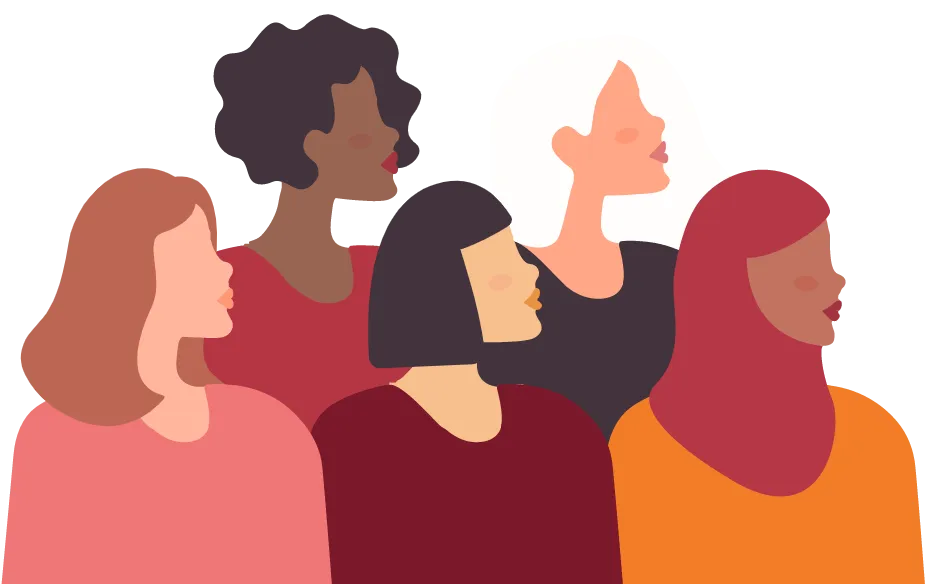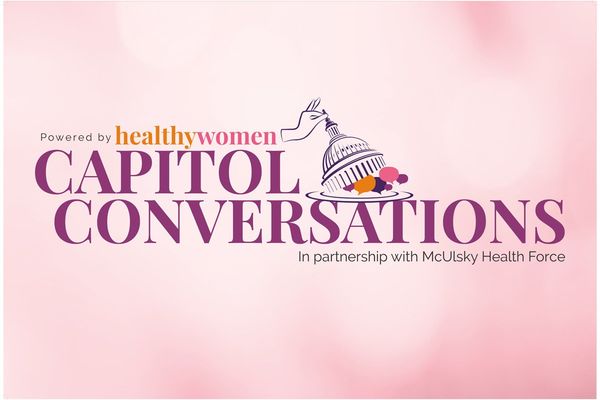
Search powered by AI
Medically Reviewed
Decisions made by policymakers directly affects your health. That is why HealthyWomen provides objective information and resources – directly and with partner organizations – to policymakers.
To guide our work, HealthyWomen regularly asks what matters most to you. For example, our WomenTALK®and other surveys help focus our policy content and activities, in these categories:
- Access
- Affordability
- Prevention
- Chronic Conditions
- Opioid Use Disorder & Treatment
- Medication Safety
- Medical Research & Clinical Trials
Additional information can be found in our Women's Health Facts and Perspectives document.
Access
Access to health care and health insurance covers a wide range of policy issues, including finding clinicians and hospitals that accept your insurance, and are geographically available. Access to prescription medicines is an additional factor for both insurance coverage (usually through formularies that have different cost-sharing tiers) and geographic access. HealthyWomen believes that access – in all forms – is critical for good health and health care, and that insurance coverage should be understandable and transparent so women and their families can make informed choices. And HealthyWomen has supported maintaining he protections of the Affordable Care Act (ACA):
- Insurance available through the ACA marketplaces (healthcare.gov), may not charge more to people with pre-existing conditions or deny them insurance, and must cover preventive services without cost as well as maternity care, mental health services, and prescription drugs.
- Other insurance options, (such as so-called short-term/limited duration health plans) may be available with lower premiums. However, those lower-priced options may not meet the ACA's requirements, and may not include coverage for certain services, such as maternity care and prescription medicines. HealthyWomen has opposed expansion of those options because they can put women's health at risk.
It may be a bit challenging, but you should try to understand what your insurance plan covers (and what it does not), and what you are expected to pay, both in-network and out-of-network. And if you are denied access to care, here are some actions you can take to challenge your insurer's decision.
Learn More about Access and Women's Health
- Understanding health insurance costs (Healthcare.gov)
- Understanding health insurance costs, Spanish version
- Understanding individual health insurance and the ACA marketplaces/exchanges
- Understanding Medicare Part D prescription drug formularies – particularly for cancer
- Patient Advocate Foundation
- Commonwealth Fund: Health Care Coverage & Access
Affordability
The Affordable Care Act (ACA) defines affordability of employer-provided health insurance as premiums for the individual employee that are less than 9.69% of a household's income. Beside the monthly premium, affordability includes deductibles or cost-sharing, including flat-dollar co-payments and percentage co-insurance for health care services or products.
The ACA includes a maximum annual limit to costs for care that you are required to pay for services covered by your insurance – which in 2020 is $8,150 for an individual and $16,300 for a family plan. However, non-ACA insurance plans (such as short term/limited duration plans), may have lower premiums, but may not have the financial protection of annual cost limits. HealthyWomen has opposed expanding such non-ACA health plans because they can discriminate against women based on their gender, age, or pre-existing conditions — and do not have to cover preventive services or maternity care.
When considering affordability, health insurance should be viewed as fundamental protection against unexpected costs rather than just pre-payment for expected costs. HealthyWomen also supports women getting better information about their care choices and costs, and the rules and costs for their insurance coverage. All of those aspects of care and insurance are important for improving affordability since they will help women make better choices. And more transparency about prices and costs for health care services and products will also help moderate total health care costs for women and their families.
For people enrolled in Medicare, it is important to note that traditional Medicare also does not have an annual cost limit for enrollees, but Medicare Advantage plans do have annual limits, but they usually have closed networks of clinicians or charge higher costs for out-of-network clinicians or providers. (Learn more about Medicare Advantage plans here.)
Learn More about Affordability and Women's Health
Prevention
Policy aspects of prevention connect Access and Affordability because prevention can be less expensive than treating diseases later, and the ACA lowered barriers to preventive services by requiring coverage – without patient cost – of many preventive services, including many specific to women's health. HealthyWomen has supported the continuation of those no-cost preventive services for women, including through the #KeeptheCare Campaign HealthyWomen launched in 2017 to educate women, health care providers and policy makers.
Learn More about Prevention and Women's Health
- Preventive Services Covered under ACA Health Insurance
- Kaiser Family Foundation: Preventive Services Covered by Private Health Plans under the Affordable Care Act (Fact Sheet)
- Women's Preventive Health Services Guidelines from the Health and Human Services and the Health Services and Resources Administration
Chronic Conditions
HealthyWomen works to promote policies for better treatments of chronic conditions because about 50 percent of adults in the United States have a chronic medical condition. As the primary caregivers in most families, women have first-hand experience with their own chronic medical conditions and those of their family members. Addressing chronic conditions is also a component of affordability because about 50 percent of health care spending is for about five percent of the population.
In addition to conditions such as heart disease, diabetes, and Alzheimer's, HealthyWomen has worked actively to promote better policies and practices for treating pain, which is frequently a component of many health conditions that are more common in women, such as migraines, autoimmune diseases like rheumatoid arthritis, and endometriosis.
Learn More about Chronic Conditions and Women's Health
- HealthyWomen's Science, Innovation & Technology Summit: Chronic Pain in Women—Focus on Treatment, Management and Barriers
- Science, Innovation & Technology Roundtable: Migraine Therapies in Women
- National Center for Chronic Disease Prevention and Health Promotion Tools & Resources
Opioid Use Disorder and Treatment
Opioid use disorder (OUD) is a biological disease similar to what can occur with tobacco or alcohol. In recent years it has exploded as a national epidemic fueled by new approaches to treating pain and the wider availability of illegal opioids such as heroin.
HealthyWomen has worked to advance discussions about the appropriate use of pain medications (as part of comprehensive treatment approaches) and non-addictive options for treating pain. Part of this work is to remove the stigma held by policymakers, clinicians and others about OUD so that there can be greater availability of treatments for people with OUD.
HealthyWomen has fostered collaboration among clinicians, patients, insurers, regulators, legislators, law enforcement, first responders, and the media, including creating a toolkit (with the Legal Action Center) for state legislators and others. As part of that work, we presented a video about how OUD treatment benefited two women at a 2018 Women in Government conference.
Learn More about Opioid Use Disorder and Women's Health
Medication Safety
Medicines are generally safe when used appropriately with the guidance of a clinician. As the primary health care decision-maker for most families, women have an important role in making sure that happens. Medication safety risks can occur if unsafe medicines make it into the supply chain, people receive inaccurate information about medicines (such as what is sometimes found on social media), or if doctors and pharmacists do not have sufficient information about sex-specific aspects of using medicines safely.
HealthyWomen works to ensure that medicines approved by the Food and Drug Administration (FDA) are safe, that specific effects and dosages for women are part of the pre-approval research, and that information about how to safely use medicines are disseminated by trusted sources. We also work to limit possibly sources of bad medicines (e.g., fake, adulterated, or contaminated), or bad information that can be equally harmful and could lead women to take medicines incorrectly, or stop using medicines without consulting with their clinician.
For example, online pharmacies – particularly those outside the U.S. (or without any physical location) – may be very problematic since medicines can be "trans-shipped" from one country through another to the U.S., and globally there are many countries where fake medicines are rampant. Buying medicines from an uncertain online pharmacy also cuts off one potentially important part of your clinical care team - your pharmacist, whether they are at your local store of at your insurance company's mail order organization. And medicines purchased from other countries are not covered by insurance benefits, and what is spent on them does not count toward your annual deductible.
HealthyWomen has expressed our general and specific safety concerns about medication safety to elected officials and policy makers. For example, we joined others in sending letters to states (such as Colorado) that were considering enabling the importation of medicines.
Learn More about Medication Safety and Women's Health
Medical Research and Clinical Trials
HealthyWomen supports more and better research about how women react differently to certain medicines; how new treatments, medical devices and diagnostic tests are best used for women; and how some diseases affect women differently.
It wasn't too long ago that most research trials were only conducted on men or male animals. Such research thus didn't provide any information about the treatment or disease in women. That has largely changed, but more needs to be done since current regulations may not always be followed, either due to ignorance or concerns about increased costs. Therefore, HealthyWomen continues to advocate for more and better sex-specific research by working with the FDA, NIH and other organizations.
HealthyWomen also seeks to improve the ability of women to participate in clinical trials. For example, we have established a navigator system for clinical trials for cancer, and you can search for clinical trials for all diseases and conditions at ClinicalTrials.gov.
Learn More About Medical Research and Women's Health
HealthyWomen content is for informational purposes only. Please consult your healthcare provider for medical advice, diagnosis or treatment.
Related Articles
Policy Statements
HealthyWomen is proud of our advocacy on behalf of women
21 Sep 2021
Chronic Care Issues









